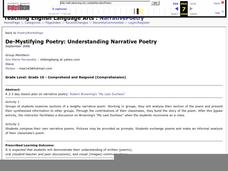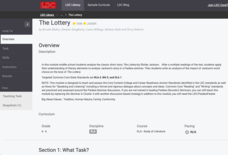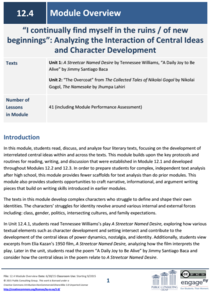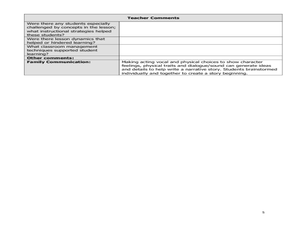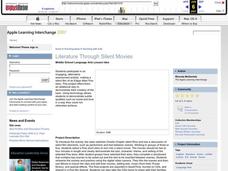21 x 20 Media
A+ Writing Prompts
Shake it up! Shake your tablet to bring up a unique writing prompt for journaling or blogging with your class. Shake again and a new one appears. Prompts can come from different categories (sketches, scenes, texts, words, news) to help...
EngageNY
Grade 11 ELA Module 4 Overview
The intricate craft of narrative writing can make a happy story feel exuberant or a sad story feel devastating. With 42 extensive lessons that include poignant discussion questions, standards-aligned self-reflections, engaging writing...
Curated OER
De-Mystifying Poetry: Understanding Narrative Poetry
Tenth graders explore narrative poetry. They analyze sections of a poem and present to groups. They compose their own narrative poems using pictures as prompts. They exchange their poems and analyze their classmate's poem.
Curated OER
Alphabet Poems
Develop fluency with a variety of works. Help kindergartners use multiple strategies to understand text and decoding. They will create an alphabet poem book on Kid Works 2 to illustrate and write their own poem. In the end, they will...
Literacy Design Collaborative
The Lottery
Shirley Jackson's short story "The Lottery" provides middle schoolers with an opportunity to hone their close reading and literary analysis skills. After annotating their copy of the story, writer's craft an essay in which they analyze...
English Worksheets Land
That Darn Cat!
Read about the darnedest can in two fables adapted from Aesop's Fables. Readers answer three reading comprehension questions that prompt them to compare and contrast animal characters in the two stories.
J. Paul Getty Trust
Still-Life Painting: Arranging Nature—Lesson 1
Art learners examine still-life arrangement images and respond to a series of prompts. In a whole-class discussion, pupils list elements and qualities that still-life paintings can have. After instructors create an arrangement and model...
K5 Learning
Will the Wolf
How well can a wolf survive without a pack? Third graders read about headstrong Will and his desire to be an independent wolf with a short story and series of comprehension questions.
Reed Novel Studies
From The Mixed Up Files Of Mrs. Basil E. Frankweiler: Novel Study
Claudia Kincaid decides to run away to bring some excitement to her life, but she never expects the adventure she finds. A helpful study guide takes readers through the novel From the Mixed Up Files of Mrs. Basil E. Frankweiler....
Reed Novel Studies
The Great Gatsby: Novel Study
Some people believe that no matter how hard a man works, the American dream will always remain out of reach. A study guide for The Great Gatsby explores the themes, such as the illusory American dream, and elements of F. Scott...
Houghton Mifflin Harcourt
Alexander Graham Bell
Study the features of nonfiction text with a set of comprehension and analysis materials. Readers learn about Alexander Graham Bell with questions about the text, writing prompts, and proofreading activities.
Vermilionville
Mardi Gras Elementary
You don't have to visit Vermilionville to experience the Cajun traditions of Mardi Gras. After examining pictures and hearing stories about these colorful traditions, learners create their own Courir de Mardi Gras masks.
EngageNY
Grade 12 ELA Module 4: Literary Analysis
Does identity come from within, or do external forces shape it? Explore the complex identity concept with a two-unit module for 12th-grade language arts. The first unit uses A Streetcar Named Desire by Tennessee Williams and "A Daily Joy...
Curated OER
Acting as a Pre-write Tool
Second graders use acting to help them in a prewriting activity to develop a story. In this prewriting lesson plan, 2nd graders form a character map and brainstorm ideas for their story.
Curated OER
The Boy Who Cried Wolf
Second graders listen to the story, THE BOY WHO CRIED WOLF and in pairs, discuss the theme of the book and two things that they liked about it. They then read the book OOPS and discuss the theme of the book identifying the things they...
Curated OER
Jacob the Great
In this reading comprehension worksheet, students read a 1 page passage titled Jacob the Great and complete comprehension, inferential, and story element questions about it. Students complete 22 multiple choice questions.
Curated OER
Literature Through Silent Movies
Students participate in an engaging, alternative assessment activity: making a silent film of an Edgar Allen Poe story. This project offers them an additional way to demonstrate their mastery of the topic.
Curated OER
the Little Red Riding Hood
Young scholars respond to the story of Little Red Riding Hood. In this Red Riding Hood instructional activity, students retell and discuss story elements. Young scholars practice phonic sounds. Students role play, make...
Curated OER
Chocolate Chaos
Second graders demonstrate the ability to examine the elements of a story (theme, plot, setting, mood) and characters, by discussing and writing about each. They have fun with chocolate related activities and enjoy reading about some...
Curated OER
When (Seasons, Day, or Night)
Practice identifying the setting with a reading activity. Kindergartners find the setting of a story by observing when the story takes place. They read the book Look! Snow! by Kathryn O. Galbraith and decide in which season the story...
Curated OER
Where is Flat Stanley?
Students create a story map of the basic elements and significant events of the book Flat Stanley. Students brainstorm places they would like to visit if they had been flattened and then, write about an imagined experience. Students...
Curated OER
The Higher Power of Lucky
Students complete activities using the book The Higher Power of Lucky. In this literature lesson, students read the story and identify the parts of the story. They create a wind chime like that found in the book.
Learning Station
More Than Anything in the World
In this reading comprehension worksheet, students will read a short passage noting point of view. Students will then complete the story adding problem solving to the story ending.
Curated OER
My Book Report
In this literacy/writing worksheet, learners compose a book report. Students identify the following literary elements: main characters, setting, beginning, problem and solution. Learners then compose paragraphs for each of these story...


